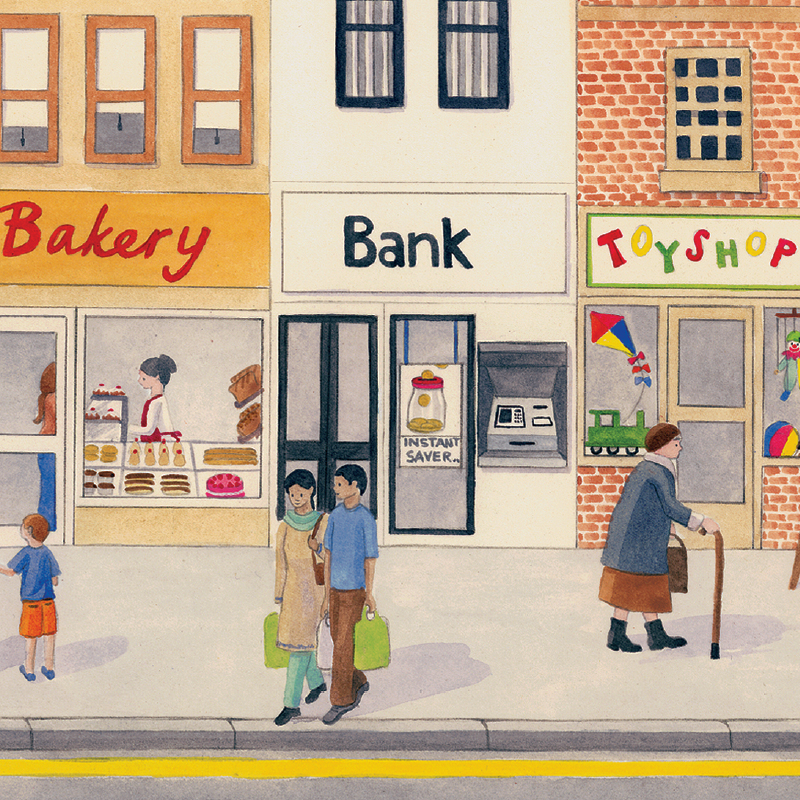Banking on the late August bank holiday - just how did bank holidays begin, anyway?
In England, late August sees the final bank holiday of the year. Traditionally, it’s a time for day trippers to head for the nearest beach, complete with bucket and spade. The theory is that we can all enjoy a final day of glorious sunshine and relaxation before preparing for any new school terms, heading off to university for the first time, or starting to prepare for the longer nights and shorter days of autumn.
In most countries, “bank” holidays are now referred to as national or official holidays: Independence Day on the 4th of July in the USA; Bastille Day on the 14th of July in France; New Year’s Day on 1 January in the majority of the world. Have you ever wondered, though, just how bank holidays began?
One of our favourite stories relates to a banker, John Lubbock, who also happened to be terribly keen on cricket. He wrote the 1871 Act of Parliament which first recognised days when banks should be closed – “bank holidays”. So the story goes, he chose dates when cricket matches were most likely to be played in his local village.
When you look at the actual dates of our bank holidays, however, you’ll find that most of them relate to existing religious or otherwise important days of celebration. While the middle of August was traditionally a time to head to the seaside, even before the coming of the trains, the arrival of the railway undoubtedly made it easier. August weather is often sunny and warm (or used to be).
Other bank holidays can trace their roots to agricultural or religious traditions. The middle to the end of August was often a time to celebrate the taking in of the last harvest, ready for the autumn months. Our late August bank holiday was originally celebrated at the beginning of August but was moved in 1971 to avoid clashing with “factory fortnight”, the two weeks a year when many factories closed down.
England and Wales now have eight Bank Holidays: New Year’s Day; Good Friday; Easter Monday; May Day (early May Bank Holiday); late May Bank Holiday; late August bank holiday; Christmas Day, and Boxing Day. Dates and names of some of the annual holidays are different in Scotland and Northern Ireland. Occasionally we’re also granted additional bank holidays for major events such as Royal Weddings or Jubilees.
Until the Sunday trading laws changed in 1994, banks weren’t the only organisations that closed down on a bank holiday: the majority of shops and leisure outlets were closed too, or had very limited opening hours. In England and Wales, shops over a certain size may still only actively trade for 6 hours a day on bank holidays and Sundays.
Only Mexico has fewer bank holidays than England, with just seven. Cambodia is top of the list, with 28 official annual holidays.
In our always-on, 24/7 world, where so many everyday transactions including banking are now carried out over the Internet, “bank holiday” is a less accurate description than it used to be: but for those who are on holiday on Monday, buckets and spades ahoy!
References
(Unless otherwise stated, all references were accessed successfully on 23 August 2019. No individual authors or editors were listed for these pages.)
In most countries, “bank” holidays are now referred to as national or official holidays: Independence Day on the 4th of July in the USA; Bastille Day on the 14th of July in France; New Year’s Day on 1 January in the majority of the world. Have you ever wondered, though, just how bank holidays began?
One of our favourite stories relates to a banker, John Lubbock, who also happened to be terribly keen on cricket. He wrote the 1871 Act of Parliament which first recognised days when banks should be closed – “bank holidays”. So the story goes, he chose dates when cricket matches were most likely to be played in his local village.
When you look at the actual dates of our bank holidays, however, you’ll find that most of them relate to existing religious or otherwise important days of celebration. While the middle of August was traditionally a time to head to the seaside, even before the coming of the trains, the arrival of the railway undoubtedly made it easier. August weather is often sunny and warm (or used to be).
Other bank holidays can trace their roots to agricultural or religious traditions. The middle to the end of August was often a time to celebrate the taking in of the last harvest, ready for the autumn months. Our late August bank holiday was originally celebrated at the beginning of August but was moved in 1971 to avoid clashing with “factory fortnight”, the two weeks a year when many factories closed down.
England and Wales now have eight Bank Holidays: New Year’s Day; Good Friday; Easter Monday; May Day (early May Bank Holiday); late May Bank Holiday; late August bank holiday; Christmas Day, and Boxing Day. Dates and names of some of the annual holidays are different in Scotland and Northern Ireland. Occasionally we’re also granted additional bank holidays for major events such as Royal Weddings or Jubilees.
Until the Sunday trading laws changed in 1994, banks weren’t the only organisations that closed down on a bank holiday: the majority of shops and leisure outlets were closed too, or had very limited opening hours. In England and Wales, shops over a certain size may still only actively trade for 6 hours a day on bank holidays and Sundays.
Only Mexico has fewer bank holidays than England, with just seven. Cambodia is top of the list, with 28 official annual holidays.
In our always-on, 24/7 world, where so many everyday transactions including banking are now carried out over the Internet, “bank holiday” is a less accurate description than it used to be: but for those who are on holiday on Monday, buckets and spades ahoy!
References
(Unless otherwise stated, all references were accessed successfully on 23 August 2019. No individual authors or editors were listed for these pages.)
- Countries With The Most Public Holidays (c2019), World Atlas: World Facts, https://www.worldatlas.com/articles/countries-with-the-most-public-holidays.html
- Nine things you might not know about bank holidays (c2019), BBC, https://www.bbc.co.uk/programmes/articles/3Wx39r1Ppmyl90z8vxjDgYh/nine-things-you-might-not-know-about-bank-holidays
- Office Holidays (c2019), Office Holidays: Your Home For The Holidays, https://www.officeholidays.com
- Sunday Trading Act 1994 (c2019), Wikipedia, https://en.wikipedia.org/wiki/Sunday_Trading_Act_1994
Related Posts
-
Early to bed, early to rise, makes [us all] healthy, wealthy and wise.
-
Silence in the library? How wordless books are helping to heal Lampedusa
-
Banking on the late August bank holiday - just how did bank holidays begin, anyway?
-
Translating or translanguaging? Helping multilingual pre-schoolers communicate - research from the Victoria University of Wellington
-
Ten Tips to Help Your Child Adjust to Life in a New Country
-
From A to E – why the first five letters of the alphabet are so important when it comes to vitamins
-
Writers, Illustrators and Critics of the Future - Mungo Makes New Friends at Dundee Polish School
-
What do you mean, it's mensis Sextilis? What have the Romans got to do with August?
-
How does Christmas sound to you? The noises, tastes and textures of the festive season
-
How to help your bilingual child speak your first language













